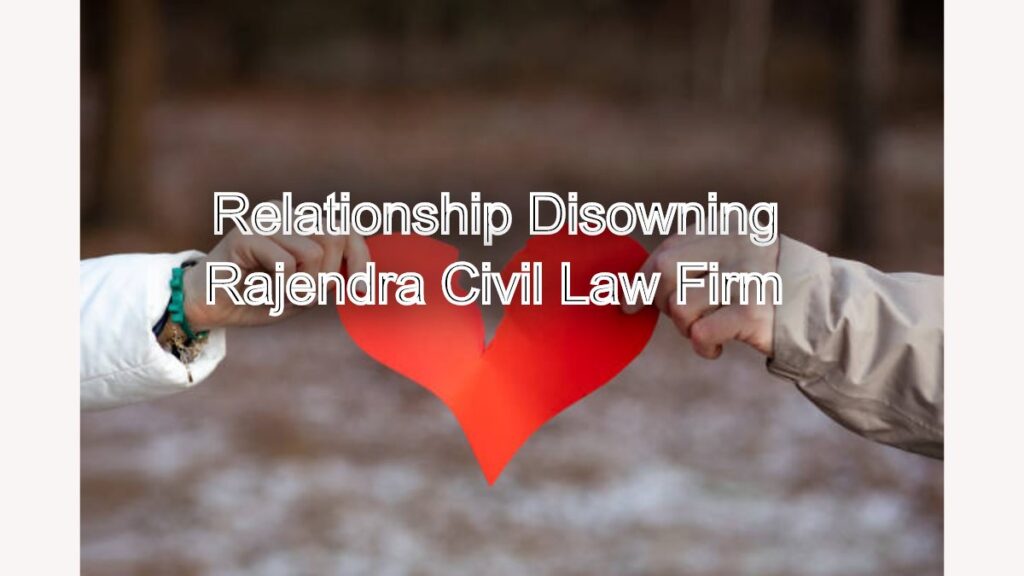Relationship Disowning: Relationships, whether familial or otherwise, form the bedrock of our social fabric. However, sometimes, these connections become so toxic or untenable that disowning becomes the only viable option. Inevitably, this process raises complex legal and emotional challenges. Consequently, seeking expert legal guidance is crucial to navigate these turbulent waters.
Navigating Relationship Disowning: Legal Guidance for Complex Situations
Understanding the Concept of Relationship Disowning
Firstly, let us clarify what relationship disowning entails. Essentially, it involves the formal or informal severance of ties with another person. This action can stem from various reasons, including abuse, financial exploitation, or irreconcilable differences. Furthermore, disowning can manifest in different forms, ranging from simple estrangement to legally documented severances.
Moreover, it is important to distinguish between emotional disowning and legal disowning. In other words, while emotional disowning involves cutting off contact and emotional ties, legal disowning requires formal legal procedures. For instance, in some jurisdictions, legal disowning can affect inheritance rights or parental responsibilities.
Legal Implications of Disowning Familial Relationships
Specifically, disowning familial relationships often involves intricate legal ramifications. For example, parental disowning can raise questions about child custody, support, and inheritance. Likewise, disowning a spouse in certain legal systems can affect property division and spousal support.
Additionally, inheritance laws play a significant role in disowning scenarios. For instance, in many jurisdictions, children have certain inheritance rights that cannot be easily revoked. However, disinheritance can be possible through carefully drafted wills or trusts, provided legal requirements are met.
Furthermore, contractual relationships can also be disowned. For example, business partnerships or joint ventures may be terminated through legal dissolution procedures. In such cases, contractual obligations and liabilities must be carefully addressed.
Addressing Complex Situations: Abuse and Financial Exploitation
Nevertheless, disowning becomes particularly complex when abuse or financial exploitation is involved. Indeed, victims of domestic violence or financial fraud may need legal protection to sever ties safely. Consequently, obtaining restraining orders or pursuing legal action for financial restitution becomes crucial.
Moreover, elder abuse and financial exploitation present unique challenges. In these situations, vulnerable individuals require legal safeguards to protect their assets and well-being. Therefore, guardianship or conservatorship proceedings may be necessary.
The Role of Legal Advocates in Disowning Cases
Therefore, the role of legal advocates is paramount in disowning cases. In essence, they provide expert guidance on the legal implications of severing relationships. To that end, they assist in drafting legal documents, representing clients in court, and negotiating settlements.
Moreover, legal advocates act as staunch defenders of their clients’ rights. For example, they advocate for restraining orders to protect victims of abuse. Also, they pursue legal action to recover misappropriated funds.
Furthermore, they ensure that all legal procedures are followed meticulously. In other words, they handle complex legal paperwork and ensure compliance with relevant laws.
Rajendra Civil Law Firm: Best Civil Advocates
In this context, Rajendra Civil Law Firm emerges as a leading provider of legal services in civil matters, including disowning cases. Indeed, their expertise and experience in handling sensitive family and financial disputes make them a trusted ally. Consequently, they possess a deep understanding of relevant laws and procedures.
Moreover, Rajendra Civil Law Firm employs a compassionate and client-centered approach. In other words, they recognize the emotional toll of disowning and provide empathetic support. Specifically, they offer personalized legal strategies tailored to each client’s unique circumstances.
Furthermore, their commitment to ethical standards and professional integrity ensures that client interests are always prioritized. In turn, they handle cases with discretion and confidentiality.
Key Legal Concepts and Procedures
In addition, several key legal concepts and procedures play a crucial role in disowning cases. For instance, restraining orders provide legal protection against abuse or harassment. Essentially, they prohibit contact between the victim and the abuser.
Another critical procedure is guardianship or conservatorship. Specifically, these proceedings appoint a legal representative to manage the affairs of an incapacitated individual. Likewise, wills and trusts enable individuals to dictate the distribution of their assets after death, allowing for disinheritance.
Furthermore, contractual dissolution involves terminating legal agreements, such as partnerships or joint ventures. For example, this procedure requires careful attention to contractual obligations and liabilities. Also, property division in divorce cases involves the equitable distribution of assets between spouses.
The Importance of Documentation and Evidence
Moreover, thorough documentation and evidence are essential in disowning cases. Indeed, detailed records of abuse, financial transactions, or communication can strengthen legal claims. Specifically, maintaining diaries, collecting emails, and preserving financial statements can be invaluable.
Similarly, witness testimonies can provide crucial support in court. In other words, individuals who have witnessed abuse or financial exploitation can corroborate the victim’s account.
In addition, seeking professional counseling or therapy can assist individuals in coping with the emotional challenges of disowning. For instance, mental health professionals can provide guidance and support during this difficult process.
Frequently Asked Questions
Legal steps vary depending on the relationship and jurisdiction. For instance, it may involve drafting wills to disinherit, seeking restraining orders for abuse, or pursuing guardianship for vulnerable individuals.
Legally, complete disownment is complex. Parental obligations often remain, especially regarding financial support. However, you can limit or terminate contact through legal means like restraining orders in extreme cases.
Disowning can affect inheritance through carefully drafted wills or trusts. However, some jurisdictions protect children’s inheritance rights, making complete disinheritance difficult.
You can pursue legal action to recover misappropriated funds, file civil lawsuits, or seek guardianship/conservatorship if the individual is deemed incapable of managing their affairs.
You should seek legal counsel when dealing with abuse, financial exploitation, or complex family dynamics. Legal experts can guide you through the process and protect your rights.
Conclusion
In summary, relationship disowning involves complex legal and emotional considerations. Therefore, seeking expert legal guidance is crucial to navigate these turbulent waters. Consequently, Rajendra Civil Law Firm, with its expertise in civil matters, can provide invaluable support. Ultimately, by understanding the legal implications and procedures involved, individuals can protect their rights and well-being. Thus, a robust legal framework is necessary to address the complexities of disowning and ensure fair outcomes for all parties involved.
Read More
- Supreme Court Matters: Expert Legal Representation for Complex Cases
- Navigating Munsiff Courts: Essential Legal Guidance for Your Case
- Resolving Builders Disputes: Legal Solutions That Work
- What is Civil Law? How to find the Best Lawyer?
- Financial Disputes Resolved: Expert Legal Counsel
- Ministry of Law and Justice



